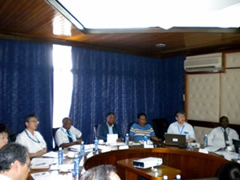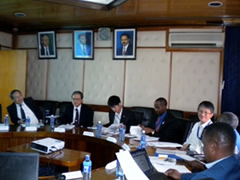- Home
- Technical Cooperation Projects
- Index of Countries
- Africa
- Kenya
- The Project for Development of Rapid Diagnostics and the Establishment of an Alert System for Outbreaks of Yellow Fever and Rift Valley Fever in Kenya
- Project News
- The Fifth Joint Coordinating Committee (JCC) and the Fourth Project Steering Committee Joint Meeting
Project News
2016-02-12
The Fifth Joint Coordinating Committee (JCC) and the Fourth Project Steering Committee Joint Meeting
The Fifth Joint Coordinating Committee (JCC) and the Fourth Project Steering Committee (PSC) joint meeting was held at the Kenya Medical Research Institute (KEMRI) Board Room on Friday, 12th February 2016.
The aim of this meeting was to share the progress of each activity since the last JCC meeting on 8th June 2015, to discuss current issue and challenges, and to talk about future plans. Dr. Gachuhi (Director of the Centre for Biotechnology Research and Development, KEMRI) was the chairman of the meeting. Fourteen participants attended, including Mr. Tambara (Senior Representative from JICA Kenya Office), Mr. Kinyangi (Health Sector, JICA Kenya Office), and two observers; Mr. Yoshida (Embassy of Japan) and Professor Ichinose (Chief Representative of KEMRI-NUITM (Nagasaki University Institute of Tropical Medicine) Kenya Research Station).
After reviewing the Minutes of the Forth JCC meeting at the beginning of the meeting, project managers of Outputs 1 to 3 presented its progress in the activities according to the Plan of Operation (PO).
For Output 1, the activities on development of rapid diagnostic test kit have been carried out. The kits for Rift Valley fever were developed and they are now at the evaluation stage to assess their quality. With regards to Yellow fever, it was reported that the Pasteur Institute in Senegal would provide the blood samples.
For Output 2, the technical transfer has been in progress and safety standards and operations of lab equipment have been taught at P3 lab at KEMRI arbovirus-hemorrhagic fever virus lab. Currently, researchers from KEMRI and Nagasaki University collaborate on analysis in virus isolation. At arbovirus lab in KEMRI Alupe, it was reported that various experiments such as ELISA and so on had been carried out.
For Output 3, it was reported that the national scale-up of mSOS (mobile SMS-based disease Outbreak alert System) was included in the Cabinet Secretary's (CS') Performance Contract in 2015/16, which is a contract between the CS and the President of Kenya. In accordance with the plans mentioned in the Performance Contract, training manuals had been developed, and currently the mSOS national scale-up training is being carried out for officers related to health sector in all 47 counties.
The change of an implementation body for the SATREPS project on Japanese side was reported as one of agenda. Japanese Agency for Medical Research and Development (AMED), which was established on 1 April 2015, has taken the management and oversight responsibility of the SATREPS project in the field of Infectious Diseases from Japan Science and Technology Agency (JST). Reflecting this transformation, it was proposed to replace the description "JST" in R/D with "AMED", and it was approved without any objection. The Addendum of R/D will be signed after going through the necessary procedure by KEMRI and Ministry of Health.
In addition, it was announced that the project was scheduled to expire at the end of January 2017. The terminal evaluation on the project will be carried out in September or October this year.
At the end of the JCC/PSC joint meeting, the closing remarks were provided by Professor Morita (Chief Advisor), Mr. Tambara (Senior Representative from JICA Kenya Office), and Professor Ichinose (Chief Representative of KEMRI-NUITM Project). It has been agreed that researchers will continue with the activities in order to achieve the project goals.
The Sixth JCC will be held at the occasion of the said terminal evaluation.


- About JICA
- News & Features
- Countries & Regions
- Our Work
- Thematic Issues
- Types of Assistance
- Partnerships with Other Development Partners
- Climate Change / Environmental and Social Considerations
- Evaluations
- Compliance and Anti-corruption
- Science and Technology Cooperation on Global Issues
- Research
- JICA Development Studies Program / JICA Chair
- Support for the Acceptance of Foreign HRs / Multicultural and Inclusive Community
- Publications
- Investor Relations
